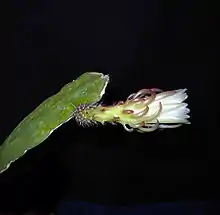Weberocereus
Weberocereus is genus of cacti. It produces a green and white flower and is found mainly in Costa Rica and Nicaragua.[1]
| Weberocereus | |
|---|---|
 | |
| Weberocereus rosei | |
| Scientific classification | |
| Kingdom: | Plantae |
| Clade: | Tracheophytes |
| Clade: | Angiosperms |
| Clade: | Eudicots |
| Order: | Caryophyllales |
| Family: | Cactaceae |
| Subfamily: | Cactoideae |
| Tribe: | Hylocereeae |
| Genus: | Weberocereus Britton & Rose |
| Species | |
| |
| Synonyms | |
Summary of the species
- Weberocereus biolleyi: Costa Rica. Stems nearly cylindrical, 4–6 mm thick. Flowers 5–6 cm long, pinkish.
- Weberocereus bradei: Costa Rica. Stems flat, ca. 12 cm wide, margins crenate, with small spines. Flowers 5.5–7 cm long, 3.5 cm wide, white, nearly spineless.
- Weberocereus glaber: Stems trigonous, 2.5-4.5 cm wide, spiny. Flowers (9-)11–14 cm long, 8–10 cm wide, spiny and hairy.
- var. glaber Guatemala. Flowers 9–10 cm long, sparsely hairy.
- var. mirandae Mexico. Flowers (10-)12–13 cm long, densely hairy.
- Weberocereus imitans: Costa Rica. Stems flat, lobed as in Epiphyllum anguliger, with small spines. Flowers 6–7 cm long, 3–4 cm wide, base moderately spiny.
- Weberocereus panamensis: Panama. Stems with 3-4 ribs, sometimes flat. Flowers 4–7 cm long, white.
- Weberocereus rosei: Stems flat, 4–8 cm wide, margins crenate. Flowers 5.5–7 cm long, whitish, the lower half densely spiny.
- Weberocereus tonduzii: Stems trigonous, ca. 3 cm wide, spines nearly lacking, minute. Flowers 7–8 cm long, 4–5 cm wide, spiny but not hairy.
- Weberocereus trichophorus: Costa Rica. Stems nearly cylindrical, spiny and densely hairy. Flower 5.5–6 cm long, pinkish.
- Weberocereus tunilla: Costa Rica. Stems 4 (-6)-angled. Flowers 6–7 cm long, pinkish.
References
| Wikimedia Commons has media related to Weberocereus. |
This article is issued from Wikipedia. The text is licensed under Creative Commons - Attribution - Sharealike. Additional terms may apply for the media files.